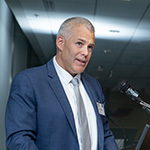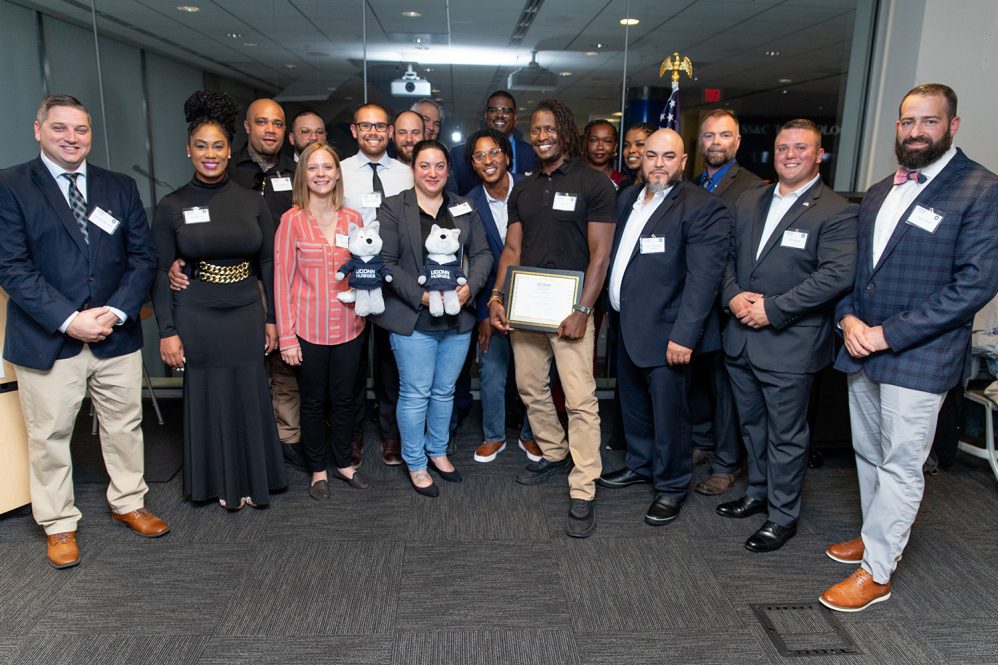Keri Yonika, an occupational therapist and a U.S. Coast Guard veteran, has both the knowledge and passion to help young children get a good start in life.
She loves her work with neurodivergent pre-schoolers, but not the constant pressure to see more clients. Yonika dreams of owning her own practice and running it with a client-centered approach.
“Often you only have time to tell the parents, ‘It was a great session,’ before your next patient arrives. Families are not getting the education or understanding to carry over therapies when they’re home,’’ she said.
In her own practice, she would spend more time with patients, offer in-home therapy options for children, create support groups, and dedicate time to coaching parents about their child’s needs and successes.
After completing the School of Business’ Entrepreneurship Bootcamp for Veterans (EBV) last week, the South Windsor, Conn.-native is one step closer to her goal.
“This program has given me a lot of confidence,’’ Yonika said. “There’s a supportive network here that’s just amazing. I know that they will encourage and support me as long I need it.’’
Bootcamp Has Served 269 Future Entrepreneurs
This year’s EBV cohort had 16 members who are aspiring to create a diverse range of businesses. The startups address mental wellness for teen girls and women, forest mulching and land management, specialty clothing, indoor playgrounds for families, a leadership and management advising firm, and more.
The UConn EBV program, under the leadership of the Connecticut Center for Entrepreneurship & Innovation (CCEI) has served 269 veterans and their spouse-business partners during its 14 years. This year’s class included participants from all branches of the military, and they came from within Connecticut and as far away as Utah and Florida.
The veterans complete online coursework before attending the in-person bootcamp at the School of Business’ Graduate Business Learning Center in downtown Hartford. During the nine-day, intensive campus experience, veterans learn how to examine business feasibility, write business plans, raise capital, attract customers, develop a marketing strategy and more. Instructors include UConn faculty and other industry experts. The program is offered at no cost to participants.
Nicholas Martinelli, EBV Program manager and a U.S. Army veteran, ran the bootcamp for the first time this year.
“This program exceeded my expectations tremendously,’’ he said. “The veterans are all very receptive. Within the first six hours, this group bonded as if they’d known each other for years. The veterans work so well together. They motivate each other and keep each other inspired.’’
The presenters had a wealth of knowledge and offered solutions to an array of issues that each veteran team has encountered, he said. The program continues to offer the veterans encouragement and business advice for the next year.
Cannabis Products Specially Tailored for Veterans
Veteran Roland Muniz, a native of New Britain, Conn., suffered a traumatic brain injury while serving in the U.S. Army in Afghanistan. With the help of family and a great support network, he has overcome crippling PTSD. But Muniz knows that many of his peers still struggle in the aftermath of war.
He’d like to create a special brand of cannabis, that would be sold nationwide, that caters to the unique needs of veterans, whether for mild relaxation or strong pain relief. He plans to direct some of the company’s profits to support veteran health and wellness programs.
Muniz, who recently graduated from CCSU with a master’s degree in graphic design, is a serial creator who is also in the process of writing two books. Since envisioning himself as an entrepreneur, Muniz said his world has become bigger.
“I’m already thinking about veterans I can add to my team moving forward,’’ said Muniz, whose wife also serves in the military. “I’m very ambitious and I have a lot of big goals. I’m a problem solver and I like to get things done.’’
‘I Want Every Inch and Every Stitch to be Made in America’
U.S. Army veteran Will Stacey said that Americans spend $4.4 million each year on American flags, the majority of them made in China.
“Personally, that doesn’t sit well with me,’’ said Stacey, who lives in Virginia. “My mission is to produce high-quality American flags that are 100 percent made in America. I want every inch and every stitch to be made in America, and to honor the men and women who made the ultimate sacrifice.’’
His startup will also sell flags of the 50 states, POW flags, military-branch flags, flag poles and other accessories. He believes his clients will be government entities and American patriots.
“I’m most excited about the system we’re creating where you can buy a flag and also retire one without leaving your house,’’ he said. Stacey, who is now earning a degree in business, has worked in law enforcement and driven tractor trailers. “I’d much rather build my own something than someone else’s,’’ he said.
“I genuinely believe the EBV program has changed my life. As an entrepreneur, I didn’t have any fear of jumping into the forest, but I didn’t have any direction. The EBV handed me a compass,’’ he said. “I’m grateful for what I’ve been given and look forward to helping others in return. I cannot say enough good things about EBV.’’
Passions, Mentors Pave the Way
Jennifer Mathieu, Executive Director of CCEI and a small-business owner as well, said that entrepreneurship is an extremely personal endeavor.
“It’s the way that we take our passions, our dreams, our ideas, and work to make them into something bigger,’’ she said. “One can only hope that what we create in life has a positive impact on the world, and that we pave the way for future generations. Through entrepreneurship we create infinite opportunities for such an impact.’’
“I hope that through this program our entrepreneurs feel even more inspired to keep pursuing their ideas and that they have gained valuable knowledge that will allow them to take their businesses to the next level,’’ she said.

During the EBV graduation ceremony on Saturday, keynote speaker and UConn alumnus Jim Crossen ’99 praised the veterans and offered advice based on his experience.
“We are here to celebrate a group of individuals who have shown remarkable initiative, courage and dedication—the veterans who have taken the bold step of starting their own businesses,’’ said Crossen, a retired U.S. Marine corporal. “And, just like their decision to join the military and face the uncertainty that came with it, they now exemplify the same spirit as they embark on their entrepreneurial journey.’’
Veteran entrepreneurs are a special breed of business leaders, he continued.
“Their military experience equips them with invaluable skills such as living and operating with uncertainty, strong organizational and management abilities, and exceptional leadership qualities. They bring a unique perspective to the business world, a combination of purpose, teamwork, and a never-give-up attitude,’’ he said.
Crossen urged the EBV graduates to find a mentor to guide them. He said his best mentor was former Secretary of Defense James N. Mattis. Mattis encouraged Crossen to attend college and to major in accounting instead of history. Crossen took that advice.
Now, 25 years later, he is a partner and CFO at Apollo Global Management, a $600 billion alternative asset management firm, headquartered in New York. He remains grateful for the advice that shaped his life and looks forward to the EBV graduates’ success.
“Your entrepreneurial journey is a testament to the spirit of veterans and it is an inspiration to us all,’’ he said.



